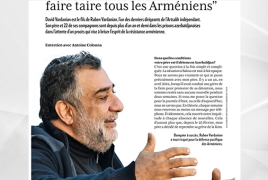
Baku aims to intimidate the entire Armenian nation through its treatment of Ruben Vardanyan, his son David Vardanyan told the French magazine Le Spectacle du Monde. In the interview, he described the political motivations behind his father's detention and trial, asserting that Azerbaijan is sending a strategic message to Armenians worldwide.
David highlighted that his father's arrest in September 2023 was deliberately filmed, calling it part of Baku’s strategy to show what it “can do to us.”
Discussing his father's detention conditions, David said, “The situation in Baku is completely non-transparent. We don’t truly know what’s happening there. For example, during my father’s hunger strike in April 2024, we had no news from him for two weeks. Even now, we often lack updates. Though in theory we’re allowed one call per week, when no news comes, we grow anxious.”
He explained that their main communication channel is the International Committee of the Red Cross (ICRC), but the process is difficult and heavily restricted. “The rules are strict. Contact is limited. Sometimes we can speak briefly by phone each week, but there’s no guarantee we’ll get another call. It depends on Azerbaijan. Letters are possible too, but once, I received one with a nine-month delay. Now Baku is preparing to ban the Red Cross entirely.”
David noted that although a lawyer is present in Baku, they are under significant pressure. A U.S.-based international legal expert is also involved in the case. “Visiting my father is impossible for us,” he said.
He emphasized that Azerbaijan is weaponizing his father's image and influence. “They’re trying to show Armenians everywhere what they’re capable of. It’s a form of psychological warfare. They already took Artsakh; now they’re hinting that Syunik is next. Azerbaijan doesn’t hide its rhetoric—claiming Armenia is ‘Western Azerbaijan.’ It’s a very troubling message for Armenia.”
He called the trial a “theater of the absurd,” stating that his father faces 44 unsubstantiated charges. “There is no evidence. Our lawyer cannot access documents—over 25,000 pages written entirely in Azerbaijani. This blocks our defense. Azerbaijan claims the trial is open, but reporters from Reuters and others were denied entry. Amnesty International has already condemned the bias.”
David insisted that their efforts extend beyond his father. “We don’t separate his case from that of other Armenian prisoners, including seven former Artsakh leaders. Baku wants silence on its genocidal actions. That’s why raising awareness—online, on radio, everywhere—is essential.”
Responding to a question about European leaders, he criticized the double standards of international politics. “It’s hard to be credible while advocating human rights and doing business with Aliyev. That includes the UK, where the Aliyev family owns properties in London. Why not apply pressure?”
Regarding the U.S., David said it’s time for a policy shift. “Many Armenians are skeptical about the Republican administration, but honestly, what has Biden done for us? Trump took a clear stand for Christians’ rights. Figures like Marco Rubio and Michael Waltz understand this issue. Armenia must show that we are a Christian people with a distinct identity. This is a chance to reshape U.S. policy.”
On diaspora support, he acknowledged strong engagement but noted a lack of coordination. “The diaspora supports us immensely. But it’s hard to carry out systematic political actions due to disconnects between diaspora groups and the Armenian government.”
When asked what Armenia’s government must do, he was direct: “The issue of prisoners is vital. Prime Minister Pashinyan says it’s important, but even a small country can act to protect its people—starting with the release of its captives. We hope the situation changes. It must be talked about, and you journalists can help ensure our prisoners aren’t forgotten.”

